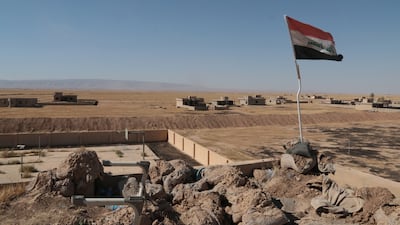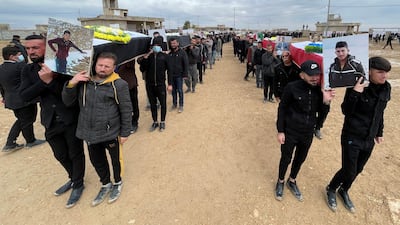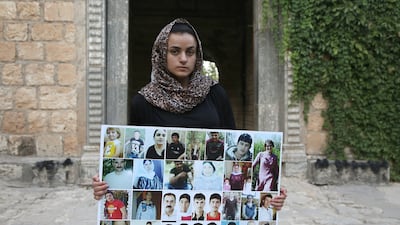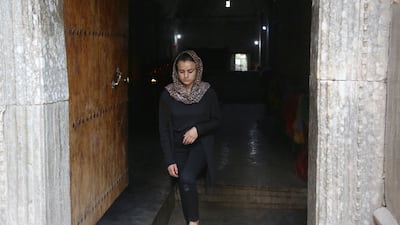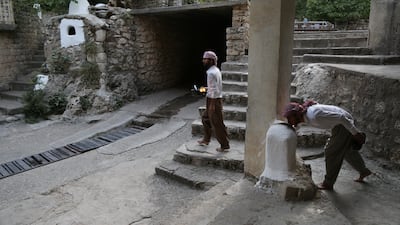Iraq plans to offer gas exploration blocks to US companies during a trip by Oil Minister Hayan Abdel Ghani, as Opec's second-largest producer seeks to boost domestic oil and gas production.
The Oil Ministry is preparing to offer about 10 gas blocks in a new licensing round, as these have not yet attracted company interest, Mr Ghani was reported as saying by the Iraqi News Agency on Saturday.
“The Ministry of Oil plans to offer these gas investment opportunities to specialised companies and we have a visit to the US soon for this purpose, as we plan to offer them to global American companies,” Mr Ghani said.
The fifth supplementary and sixth licensing rounds include 29 blocks and oilfields, with contracts finalised for 14 of them.
Mr Ghani said Iraq will start a new gas project at Al Faiha oilfield in the south.
This project will produce 125 million cubic metres of gas per day and is part of the country’s efforts to boost its energy infrastructure.
He also said the ministry had started drilling an exploratory well in Al Anz oil and gas block in Iraq's Al Anbar governorate, while the Halfaya project is underway in the southern Maysan province, about 300km south of Baghdad.
"The Halfaya gas investment project was opened with a capacity of 300 cubic metres, and it is hoped to launch the gas investment project in the Al Faiha oilfield by the end of this year," Mr Ghani said.
Iraqi Prime Minister Mohammed Shia Al Sudani in June inaugurated the Halfaya processing project, which uses flared gas during oil extraction.
The latest announcement comes after China, the biggest buyer of Iraqi crude, secured most of the available oilfields in previous licensing rounds.
China, the world's second-largest economy, imports about 1.18 million barrels per day from Iraq, which is more than a third of the latter's total crude exports, according to S&P Global.
In 2021, China’s state-run Sinopec energy company won a deal to develop a major gasfield in eastern Iraq. A contract was signed to develop the 4.5 trillion cubic feet Mansuriya field for 25 years.
Iraq began to attract international oil companies after the security situation in the country stabilised in 2008. Among them were ExxonMobil, Shell, BP, China’s CNPC and Russia’s Lukoil.
Since then, Iraq has awarded dozens of oil deals to develop major fields that hold more than half of its 145.02 billion barrels of proven reserves. Deals to tap natural gas resources have also been agreed on.
Iraq’s Oil Ministry plans to increase production to 6 million bpd in the next five years, from about 4 million bpd currently. It exports about 3.3 million bpd.
A timeline of the Historical Dictionary of the Arabic Language
- 2018: Formal work begins
- November 2021: First 17 volumes launched
- November 2022: Additional 19 volumes released
- October 2023: Another 31 volumes released
- November 2024: All 127 volumes completed
UAE currency: the story behind the money in your pockets
UAE currency: the story behind the money in your pockets
'Laal Kaptaan'
Director: Navdeep Singh
Stars: Saif Ali Khan, Manav Vij, Deepak Dobriyal, Zoya Hussain
Rating: 2/5
65
%3Cp%3E%3Cstrong%3EDirectors%3A%20%3C%2Fstrong%3EScott%20Beck%2C%20Bryan%20Woods%3C%2Fp%3E%0A%3Cp%3E%3Cstrong%3EStars%3A%20%3C%2Fstrong%3EAdam%20Driver%2C%20Ariana%20Greenblatt%2C%20Chloe%20Coleman%3C%2Fp%3E%0A%3Cp%3E%3Cstrong%3ERating%3A%20%3C%2Fstrong%3E2%2F5%3C%2Fp%3E%0A
MATCH INFO
Asian Champions League, last 16, first leg:
Al Ain 2 Al Duhail 4
Second leg:
Tuesday, Abdullah bin Khalifa Stadium, Doha. Kick off 7.30pm
THE CLOWN OF GAZA
Director: Abdulrahman Sabbah
Starring: Alaa Meqdad
Rating: 4/5
The%20specs
%3Cp%3E%3Cstrong%3EEngine%3A%20%3C%2Fstrong%3E3.6-litre%2C%20V6%0D%3Cbr%3E%3Cstrong%3ETransmission%3A%20%3C%2Fstrong%3Eeight-speed%20auto%0D%3Cbr%3E%3Cstrong%3EPower%3A%20%3C%2Fstrong%3E285hp%0D%3Cbr%3E%3Cstrong%3ETorque%3A%20%3C%2Fstrong%3E353Nm%0D%3Cbr%3E%3Cstrong%3EPrice%3A%20%3C%2Fstrong%3EDh159%2C900%0D%3Cbr%3E%3Cstrong%3EOn%20sale%3A%20%3C%2Fstrong%3Enow%3C%2Fp%3E%0A
SUCCESSION%20SEASON%204%20EPISODE%201
%3Cp%3E%3Cstrong%3ECreated%20by%3A%20%3C%2Fstrong%3EJesse%20Armstrong%3C%2Fp%3E%0A%3Cp%3E%3Cstrong%3EStars%3A%3C%2Fstrong%3E%20Brian%20Cox%2C%20Jeremy%20Strong%2C%20Kieran%20Culkin%2C%20Sarah%20Snook%2C%20Nicholas%20Braun%3C%2Fp%3E%0A%3Cp%3E%3Cstrong%3ERating%3A%3C%2Fstrong%3E%204%2F5%3C%2Fp%3E%0A
Lexus LX700h specs
Engine: 3.4-litre twin-turbo V6 plus supplementary electric motor
Power: 464hp at 5,200rpm
Torque: 790Nm from 2,000-3,600rpm
Transmission: 10-speed auto
Fuel consumption: 11.7L/100km
On sale: Now
Price: From Dh590,000
RACECARD
%3Cp%3E5pm%3A%20Al%20Shamkha%20%E2%80%93%20Maiden%20(PA)%20Dh80%2C000%20(Turf)%201%2C400m%0D%3Cbr%3E5.30pm%3A%20Khalifa%20City%20%E2%80%93%20Handicap%20(PA)%20Dh80%2C000%20(T)%201%2C400m%0D%3Cbr%3E6pm%3A%20Masdar%20City%20%E2%80%93%20Handicap%20(PA)%20Dh80%2C000%20(T)%201%2C600m%0D%3Cbr%3E6.30pm%3A%20Wathba%20Stallions%20Cup%20%E2%80%93%20Handicap%20(PA)%20Dh70%2C000%20(T)%202%2C200m%0D%3Cbr%3E7pm%3A%20Emirates%20Championship%20%E2%80%93%20Group%201%20(PA)%20Dh1%2C000%2C000%20(T)%202%2C200m%0D%3Cbr%3E7.30pm%3A%20Shakbout%20City%20%E2%80%93%20Handicap%20(TB)%20Dh80%2C000%20(T)%202%2C400m%3C%2Fp%3E%0A
COMPANY PROFILE
Initial investment: Undisclosed
Investment stage: Series A
Investors: Core42
Current number of staff: 47
The%20specs
%3Cp%3E%3Cstrong%3EEngine%3A%20%3C%2Fstrong%3E4.0-litre%20flat%206-cylinder%0D%3Cbr%3E%3Cstrong%3ETransmission%3A%20%3C%2Fstrong%3E7-speed%20PDK%0D%3Cbr%3E%3Cstrong%3EPower%3A%20%3C%2Fstrong%3E500hp%0D%3Cbr%3E%3Cstrong%3ETorque%3A%20%3C%2Fstrong%3E450Nm%0D%3Cbr%3E%3Cstrong%3EPrice%3A%20%3C%2Fstrong%3EDh530%2C300%20as%20tested%0D%3Cbr%3E%3Cstrong%3EOn%20sale%3A%3C%2Fstrong%3E%20Now%3C%2Fp%3E%0A
GAC GS8 Specs
Engine: 2.0-litre 4cyl turbo
Power: 248hp at 5,200rpm
Torque: 400Nm at 1,750-4,000rpm
Transmission: 8-speed auto
Fuel consumption: 9.1L/100km
On sale: Now
Price: From Dh149,900
Results
4.30pm Jebel Jais – Maiden (PA) Dh60,000 (Turf) 1,000m; Winner: MM Al Balqaa, Bernardo Pinheiro (jockey), Qaiss Aboud (trainer)
5pm: Jabel Faya – Maiden (PA) Dh60,000 (T) 1,000m; Winner: AF Rasam, Tadhg O’Shea, Ernst Oertel
5.30pm: Al Wathba Stallions Cup – Handicap (PA) Dh70,000 (T) 2,200m; Winner: AF Mukhrej, Tadhg O’Shea, Ernst Oertel
6pm: The President’s Cup Prep – Conditions (PA) Dh100,000 (T) 2,200m; Winner: Mujeeb, Richard Mullen, Salem Al Ketbi
6.30pm: Abu Dhabi Equestrian Club – Prestige (PA) Dh125,000 (T) 1,600m; Winner: Jawal Al Reef, Antonio Fresu, Abubakar Daud
7pm: Al Ruwais – Group 3 (PA) Dh300,000 (T) 1,200m; Winner: Ashton Tourettes, Pat Dobbs, Ibrahim Aseel
7.30pm: Jebel Hafeet – Maiden (TB) Dh80,000 (T) 1,400m; Winner: Nibraas, Richard Mullen, Nicholas Bachalard
PAKISTAN SQUAD
Pakistan - Sarfraz Ahmed (captain), Azhar Ali, Fakhar Zaman, Imam-ul-Haq, Babar Azam, Shoaib Malik, Mohammad Hafeez, Haris Sohail, Faheem Ashraf, Shadab Khan, Mohammad Nawaz, Mohammad Amir, Hasan Ali, Aamer Yamin, Rumman Raees.
How to donate
Send “thenational” to the following numbers or call the hotline on: 0502955999
2289 – Dh10
2252 – Dh 50
6025 – Dh20
6027 – Dh 100
6026 – Dh 200
The%20specs
%3Cp%3E%3Cstrong%3EEngine%3A%3C%2Fstrong%3E%204.0-litre%20twin-turbo%20V8%3Cbr%3E%3Cstrong%3EPower%3A%20%3C%2Fstrong%3E680hp%20at%206%2C000rpm%3Cbr%3E%3Cstrong%3ETorque%3A%20%3C%2Fstrong%3E800Nm%20at%202%2C750-6%2C000rpm%3Cbr%3E%3Cstrong%3ETransmission%3A%20%3C%2Fstrong%3ERear-mounted%20eight-speed%20auto%3Cbr%3E%3Cstrong%3EFuel%20consumption%3A%20%3C%2Fstrong%3E13.6L%2F100km%3Cbr%3E%3Cstrong%3EOn%20sale%3A%3C%2Fstrong%3E%20Orderbook%20open%3B%20deliveries%20start%20end%20of%20year%3Cbr%3E%3Cstrong%3EPrice%3A%20%3C%2Fstrong%3EFrom%20Dh970%2C000%3C%2Fp%3E%0A



